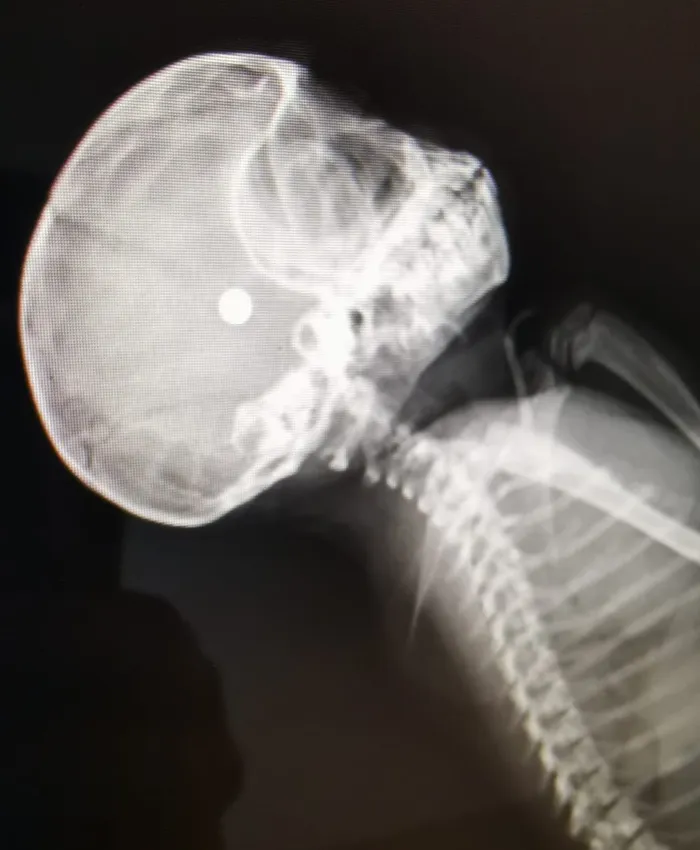Air rifle shot kills baby monkey

The X-ray showing the air rifle pellet lodged in Baby Gump’s brain after he was shot between the eyes. | Supplied
Durban — The Monkey Helpline was called to an eMdloti residence after a baby monkey was shot in the head by an airgun.
Resident Michelle Khoury saw the monkey falling from a tree. She picked it up and kept it in her yard while she called for help.
Craig Johnstone from Monkey Helpline arrived to help, but “Baby Gump” was unresponsive so he was taken to Riverside Veterinary Clinic.
Dr Kerry Easson found an entry wound in his forehead, and an X-ray showed he had been shot in the head with an air rifle.
“The shot penetrated the brain and blinded the monkey. He was in such excruciating pain that he was disorientated, which caused him to fall out of the tree. The saddest part is we don’t know how long he was suffering for,” said Johnstone.
“The monkey was given painkillers but the injuries were too serious and he had to be euthanised.”
Monkey Helpline responds to more than 1 800 rescue call-outs every year attending to injuries ranging from wounds sustained during fights with other monkeys and dog bites to being shot with air (pellet) guns. At least four times a month they find monkeys with air gun pellets lodged in their bodies.
“The high velocity bullets meant for monkeys also pose a risk for humans. We saw a case where someone was aiming for a monkey but the bullet missed and went through a window and almost shot a young girl.
“Children shoot monkeys for fun and this could lead to more issues.
“We have reported this latest shooting and hope action will be taken. We know who the person is: they are being investigated and we hope to lay charges of animal cruelty.
“Monkeys are not a threat, they don’t attack and if they do, they won’t without a reason. The monkeys have nowhere to go with all the new development. Their areas are disappearing.”
Feeding monkeys could cause them to associate humans with food and become problematic in residential areas.
“Feed informally, away from residential areas and never feed the monkeys by hand. Put the food down before monkeys arrive, without them seeing you, because once they see humans giving food, they will keep coming back.
“Baby monkeys are not dangerous, but keep an eye on mom: she will likely perceive you as a threat to her baby. If we let monkeys be monkeys, we can live harmoniously together and preserve this special part of our African wildlife,” said Johnstone.
WHEN RESCUING MONKEYS:
DON’T:
- Put yourself at risk if the monkey is injured or aggressive.
- Leave an injured monkey on the road because other cars will kill it.
- Leave the scene without handing it over to someone.
DO:
- Stop and secure the area.
- If dead, remove the body from the road to prevent injuries of birds of prey or other monkeys that may try to assist dead or injured members of their troop. Vets will dispose of dead wildlife, free of charge.
- Report the injury to Monkey Helpline and drop a pin.
- Stay with an injured monkey or keep it in sight, or they are hard to find.
- Restrain with a jersey / towel or blanket until assistance arrives.
Independent on Saturday
Related Topics: